Rural women build resilience to climate change in the Sahel
Rural women play a central role in the agricultural sector in the Sahel. They are active all along the production chain, from the work in the field to the sale and processing of products, and are the first to suffer from the effects of climate change. We went to meet those who are working at increasing the resilience to socio-economic and environmental challenges in Mali and Mauritania.
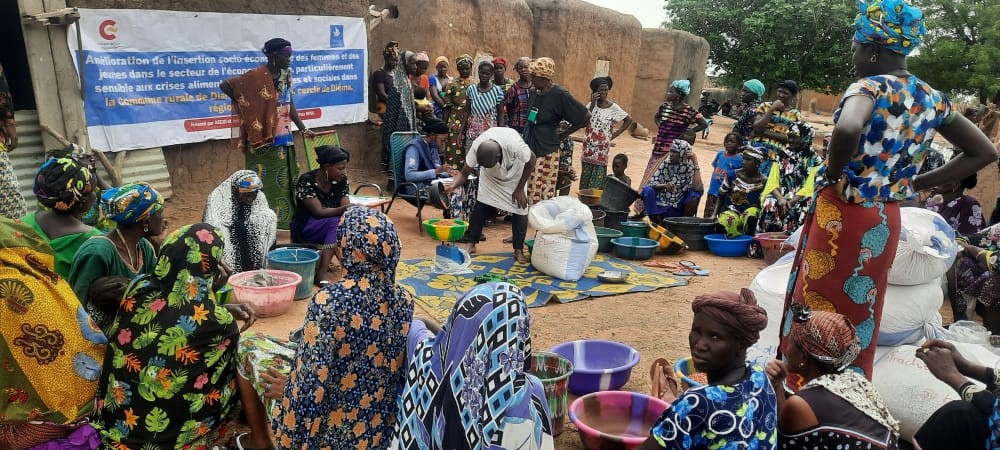
Farming in Mali, a journey fraught with difficulties
In Mali, more than 77% of women live in rural areas and account for nearly 70% of food production, according to the latest general population and housing census in 2009[1]. They play a key role in economic and local development, particularly in the agricultural sector. But farming in Mali is far from easy: since the 1970s, rural communities have been affected by several waves of drought, rainfalls have become scarce and temperatures have risen. In addition, deforestation due to excessive logging, soil degradation and lack of agricultural land have an impact on productivity and food security.

Faced with socio-economic challenges and environmental constraints, more and more women are deciding to move to other regions of Mali or abroad. It is therefore essential to help them build resilience to climate change, particularly in the Kayes region in the North-West of Mali, one of the country’s main migration areas.
The collective approach to building women’s resilience
In Diéma and Kita, two circles in the Kayes region, the NGO MPDL (Mouvement pour la Paix, le Désarmement et la Liberté) financed by Spanish cooperation is implementing a project for the socio-economic integration of women and young people affected by the food, economic and social crises.
The MPDL’s Programme Coordinator, Mr Louka Daou, explains:
As improved seed banks were made available, more than 1,400 women have been grouped into 15 associations to operate vegetable gardening areas equipped with a solar water pumping system on 13.5 hectares for the cultivation, consumption and sale of vegetables. »
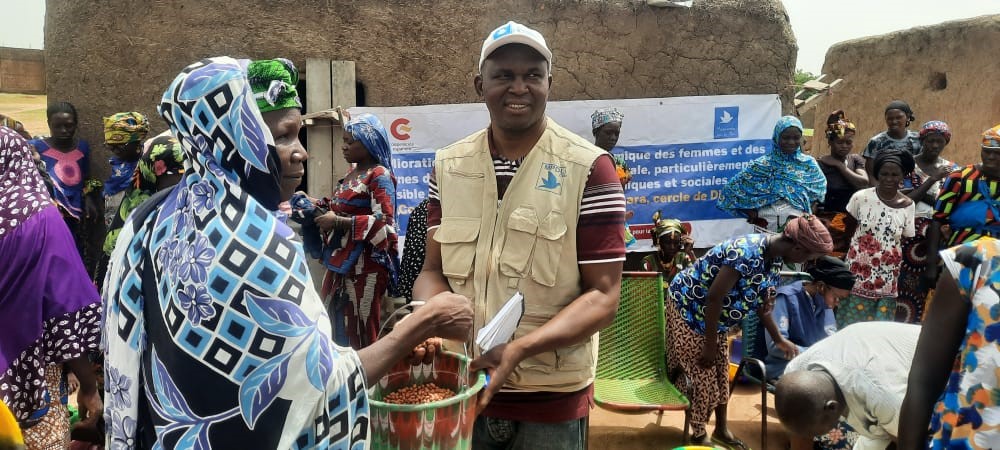
Natural resource management is at the heart of the project, with awareness-raising and reforestation activities, as “the tree calls for rain”. In addition to feeding families and generating financial resources, the vegetable gardens maintained by the women help restore the soil.
Cereal banks and food shops ensure the storage and conservation of products to be sold at competitive prices on the domestic market during the lean season. Thanks to the warrantage scheme (rural credit system), which allows small-scale farmers to obtain loans by collateralizing their production (millet, rice, maize, groundnuts, etc.), more than 1,000 groundnut producers organised in 13 associations will have access to credit from microfinance institutions to launch income-generating activities (vegetable gardening, small-scale trade, cattle fattening,…) during the next season. 21,930,000 CFA (about 33,480 €) have already been mobilised for more than 1,400 women from tontine associations in Diéma and Kita.
In Diéma, however, some vegetable gardening plots had to be abandoned because the wells had dried up. After consultation with the women’s groups, the local authorities and the donor, the support was redirected by mutual agreement towards an alternative activity chosen by the beneficiaries. 48 women thus received animal kits for sheep fattening in order to (re)build a flock.
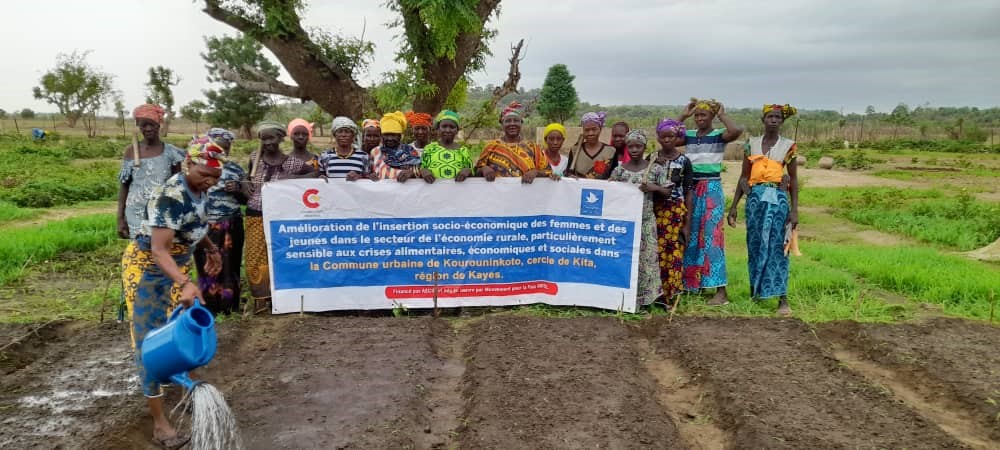
Django Amy Magassa, a member of an association in Diéma, says:
I received support for sheep breeding. I do the fattening and then sell the animals. The money generated has been used to buy other sheep and the surplus earned allows me to cover the children’s school fees, to cover my own small expenses and to help my husband with the family’s needs. »
One of the solutions advocated by the NGO MPDL’s coordinator to build the resilience of rural communities in Diéma is the construction of micro-dams to retain and manage surface water collected during the rainy season. Among other things, these structures help mitigate rainfall deficits and ensure that the vegetable and rice crops are irrigated, that the biodiversity is developed and the water table restored.
Caring for the land, shaping minds
A whole associative dynamic is gradually taking shape. At the intervention sites, 67 functional literacy centres enable beneficiaries to learn how to read and write. Thus, more than 5,600 women from Kita and Diéma have received training in associative life as well as economic and financial management. They have been supported in setting up associations and cooperatives and in obtaining legal administrative documents. The positive impacts are felt at the nutritional, social and economic levels. It is a means of combating poverty and a factor of social cohesion, which has, for example, made it possible to resolve community conflicts over land and natural resources between two neighbourhoods in the village of Néguébougou (Kita Circle).
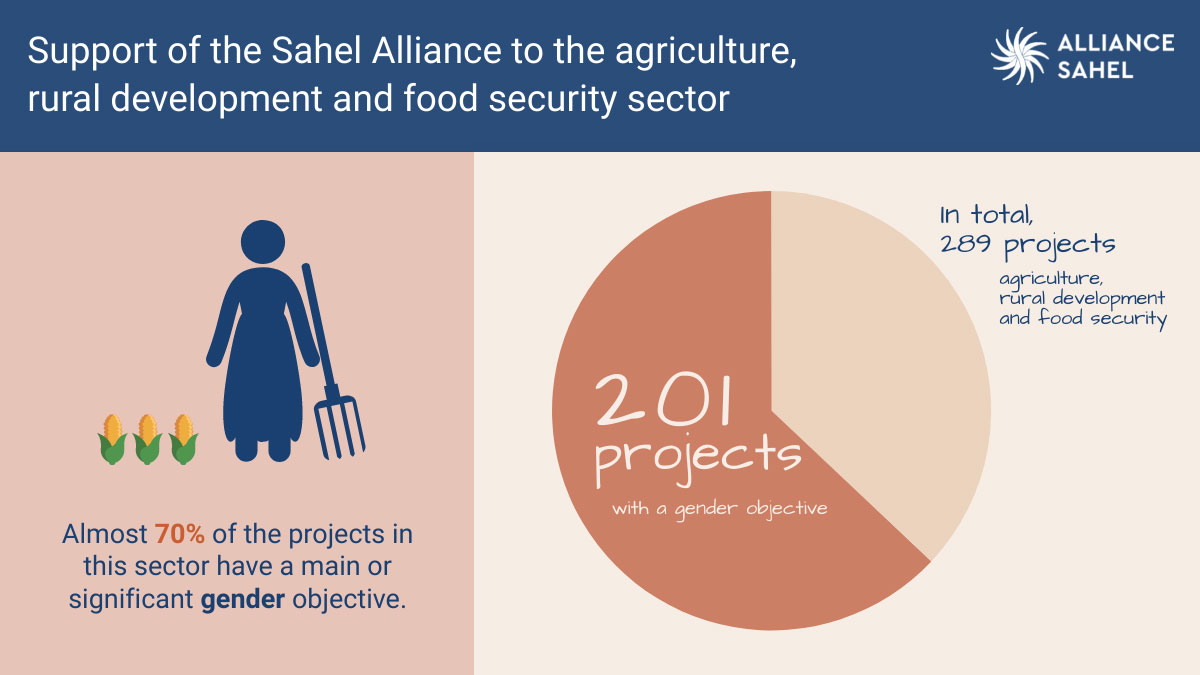
Mauritania’s agriculture and the impact of climate change
In Mauritania too, climate change is generating a severe degradation of ecosystems and a rural exodus of populations., The phenomenon of desertification known as silting has caused homes and fields to be swallowed up and livestock farming to decline. Episodes of droughthave forced many Mauritanians to cut down forest cover to find new grazing land.
Scarce rainfall and soaring temperatures affect soil irrigation, which is the key factor in the issue of access to water. Less than 1% of the land is considered arable. However, about 38% of the total land area is used for agriculture. Despite low production, agriculture is vital for the Mauritanian economy, both through agricultural production and livestock which generate almost 30% of GDP. Climate change affects the rural population the most. 74% of the population lives below the poverty line.
Guidimakha, an agricultural potential to be supported
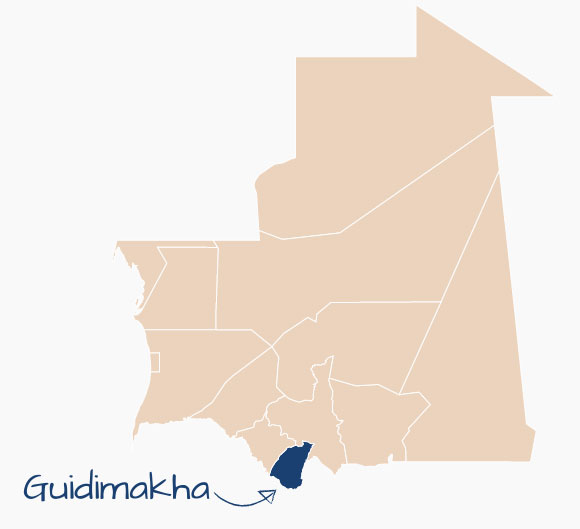
The Guidimakha region, located in the south-eastern most part of Mauritania on the border of Senegal and Mali, is among the poorest in the country. Its population, mostly rural, struggles to make a decent living from the income generated by agriculture. Women, who are the main protagonists of this agricultural production, are the most affected as they benefit very little from it and face the daily challenges of climate change.
However, the land is fertile and rainfall is favourable, unlike in other parts of the country. But the region’s vegetable gardeners lack quality seeds and fertilisers. Their irrigation systems are inadequate and inefficient. They face difficulties with regards to the conservation, processing and storage of fast perishable products.
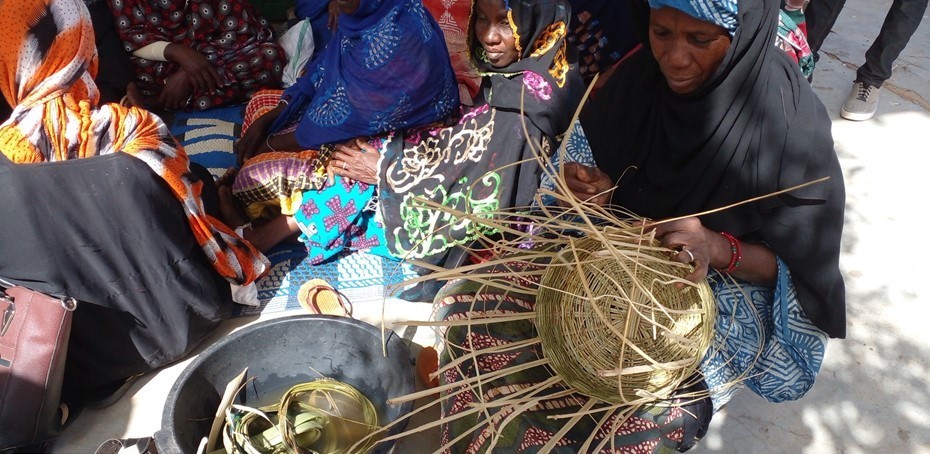
Supporting women with adaptation measures
Mauritania’s Ministry of Environment and Sustainable Development has decided to address these challenges, with the support of GIZ. Since 2021, the project on co-management of natural and land resources has been improving the resilience of vulnerable populations, especially women, by developing strategies directly related to the climate and strengthening adaptive capacities. In order to curb adverse impacts on natural resources and biodiversity, it supports the strengthening of governance and management systems as well as ecosystem services. Women farmers are trained in natural and land resource management, including learning the most suitable techniques for processing local products or setting up a crop calendar in order to improve farming practices and facilitate harvesting through adequate natural resource management.
Today, the project works with 25 associations for the collective local management of forest and pastoral areas, spread over 11 municipalities, covering 61% of the wilaya’s surface area, i.e. 628,300 hectares.
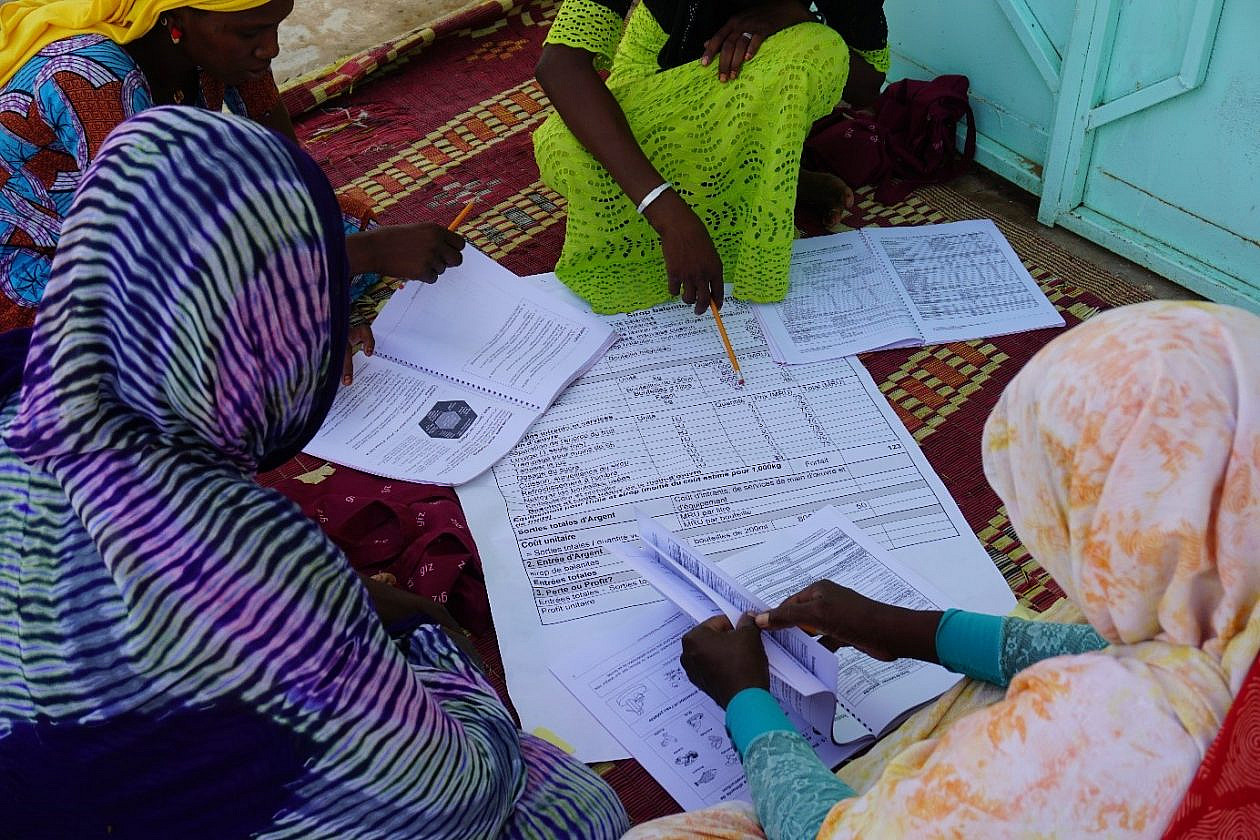
The project also aims to support the development of a common non-timber forest product processing unit. The creation and economic development of green jobs for women are also supported. Thanks to the project, nearly 1,200 people are employed in the processing of non-timber forest products, 99% of whom are women!
Mahfoudah Mint Mohamed, president of the Tachott-Hassi Cheguar users’ association, testifies:
The joint management of our natural resources has brought us together. Before, you could see the next village from here. Now, there are so many trees that we have a forest again. The forest provides us with food and many other products (such as gum arabic). These are harvested by women. We also feel that the firebreaks/walls we have built prevent the destruction of grazing surfaces. These improved living conditions mean that young people stay in the village more. We have more water, food, grazing land and social cohesion than a few years ago. »
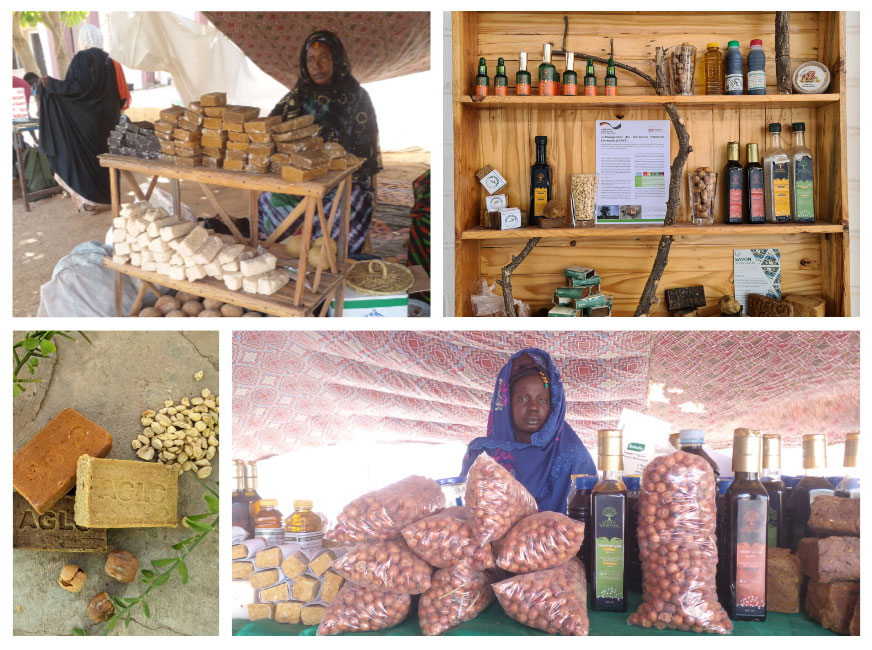
Coumba Hamady Diallo, a processor from the Moudji Sud user association also shares her experience:
We are very happy to work with the GIZ project of the German Cooperation and with the AGLC umbrella structure in Guidimakha. Before, we were only housewives, but thanks to the project, we also became NTFP processors […] We know the importance of the trees, for example Balanites and its fruits that give syrup, oil, soap and also cattle feed. And today, thanks to the women supervisors, no one can abuse the forest.”
Agricultural and food issues remain at the heart of the Sahel Alliance’s priorities. Last June, at the 9th Steering Committee, the Sahel Alliance’s “Agriculture, Rural Development and Food Security Coordination Group” published a series of recommendations. These include strengthening the resilience of the most vulnerable populations to climate change through initiatives such as the restoration of agroecosystems, sustainable and climate-smart agricultural practices, the digitisation of agriculture and water management. Rural women in Mali and Mauritania are already playing an important role in these recommendations.
An article by Sadjo Coulibaly and Raissa Chaitou (October 2022)
Sources:
- Plan National Sécheresse du Mali 2021-2025
- Processus migratoires et dynamiques sociales et politiques dans la région de Kayes au Mali: un nouveau regard pour de nouvelles tendances
- Mauritania: one country against the Sahara (Global Climate Change Alliance Plus)
- La Mauritanie se mobilise pour protéger des villes côtières (média Terre)
- Investir dans les populations rurales en République islamique de Mauritanie (FIDA)
- Promoting participatory management of natural resources (GIZ)
Go further

